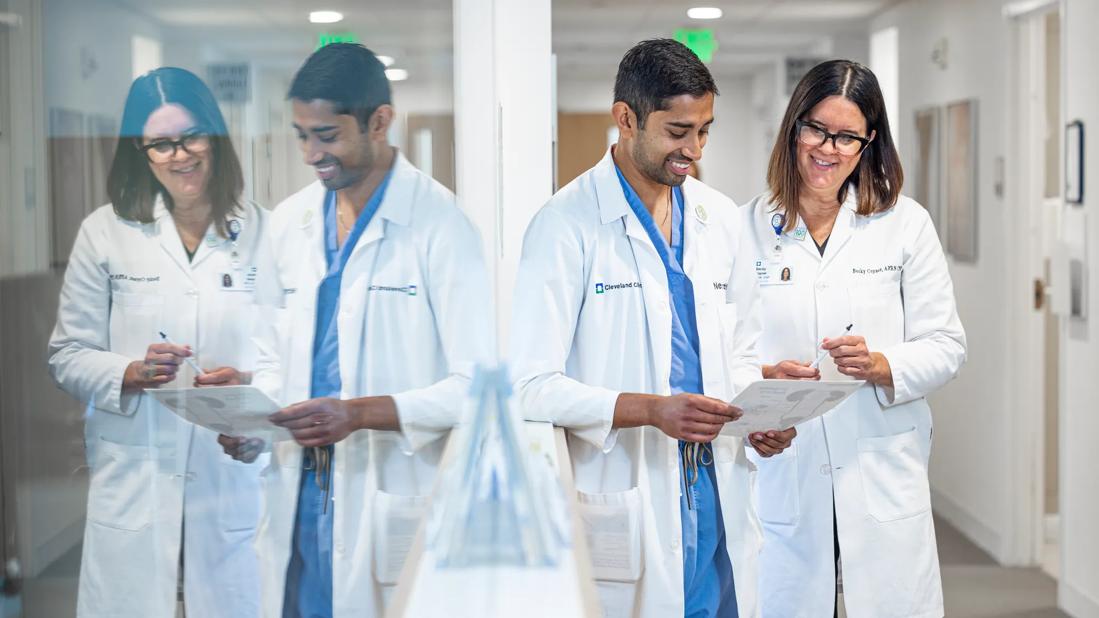Nurses expand their careers by honing leadership and research skills

Image content: This image is available to view online.
View image online (https://assets.clevelandclinic.org/transform/d5e9e05a-40b3-4a8f-8e69-5ae6c9653006/URL_5242308_10-18-24_1213_AMO)
23-NUR-3533646-NN-APRN-ProfDevPathwayProgram-CQD-2_650x450
As an Advanced Practice Registered Nurse (APRN) at Cleveland Clinic, Shaneeka Rice, MSN, CNP, takes great pride in her clinical work, but she says she has always had her eye on a loftier goal. “I’ve known from the beginning that leadership would be a part of my career,” she explains. “It’s one of the reasons I chose to work at an academic medical center — the opportunity to learn, grow and really explore the boundaries of the nursing profession.”
Advertisement
Cleveland Clinic is a non-profit academic medical center. Advertising on our site helps support our mission. We do not endorse non-Cleveland Clinic products or services. Policy
Rice is not alone. Despite the ubiquitous tales of caregiver burnout, a recent learning needs survey conducted by Cleveland Clinic’s APRN Council revealed that nurses are still eager to assume additional adjunct roles that extend beyond their clinical responsibilities.
“Our APRNs want to grow and develop beyond the clinical experience; they have so much more to contribute,” says Pamela Combs, DNP, BC-ANP, Advanced Practice Provider Manager of Community Outreach for the Taussig Cancer Institute and Co-Chair of the Professional Development Committee of the APRN Council.
“The information gathered from the survey made it abundantly clear that our nurses want to be challenged. They want more from their careers.”
In 2019, Combs and her team set out to develop a formal mentorship and education program designed to prepare nurses for expanded roles. When reviewing current literature, the council’s planning committee found that although many organizations offered growth opportunities for APRNs, few had well-defined, formalized curricula or guided learning programs.
“The APRN is still a relatively young discipline in many states. We recognized that we had an opportunity — maybe even a responsibility — to set a precedent in preparing our APRNs for expanded roles beyond the bedside,” explains Combs.
Drawing on their own experiences and consultations with other advanced practice nurse managers and APRN Council members, the committee developed the Professional Development Pathways Program, a sustainable platform through which APRNs could choose one of four areas of specialization: research, education, leadership or quality.
Advertisement
The program, launched in 2021, includes several key educational components, including:
• Quarterly meetings – In-person sessions include presentations by Cleveland Clinic content experts, roundtable discussions and role-playing with mentors. The meetings are designed to show participants how to use their new skills to address actual on-the-job situations.
• Online learning activities
• Mentoring – Each participant is matched with a mentor with expertise in their chosen pathway.
• Culminating project – Each participant completes a project related to their pathway that benefits their institute. The research pathway was designed to be two years long.
At program completion, each participant receives a Cleveland Clinic-recognized certificate of completion. Rice, who recently shared her project results with nursing leadership (and her family), says the experience far exceeded her expectations.
“I developed wonderful relationships with my mentor and other colleagues in high-level positions,” she says. “The opportunity helped me become more comfortable in my caregiving role and taught me how to advocate for the things I feel most passionate about.”
Rice’s work includes the creation of a pipeline that will enable APRN students of varied backgrounds to connect directly with Cleveland Clinic’s Office of Recruitment during their training. When on the job at Express Care Online in Lyndhurst, Ohio, Rice continues to educate her colleagues about a culture of engagement. Her experience in the program also motivated her to pursue a doctoral degree.
Advertisement
The population of patients from all backgrounds that Tamara Howell, MSN, APRN, CNP, encounters while working in Cleveland Clinic’s primary care facilities fueled her long-standing interest in clinical research — and the Pathways Program.
“My primary interest is improving differences in health outcomes and understanding the factors that make it difficult for some patients to access the help they need,” she explains. “I’ve been incredibly lucky to have found an unparalleled nursing research program led by talented, generous nurse scientists willing to share their expertise.”
Howell, an APRN at Cleveland Clinic Euclid Hospital and Willoughby Hills Family Health Center, has completed Year 1 of the program. In her culminating project, she will assess the physiological and demographic factors (including sexual orientation) of women aged 50 years and older to understand whether relationships exist between those characteristics and satisfaction with life. Pending IRB approval, she hopes to begin the research this year.
“I’ve loved every minute of the program so far and recommend it to anyone interested in nurse research,” she says. “New knowledge and hands-on involvement helped prepare me for graduate studies in a way that no other experience could provide.” Inspired by the Pathways Program, Howell began her own doctoral studies in 2022.
The program is currently available at Cleveland Clinic Florida and all Cleveland Clinic facilities in Ohio. Plans are underway for expansion in the healthcare system’s international locations as well.
Advertisement
“Our participants are making huge strides in patient care, quality outcomes and job satisfaction, all of which enhance employee retention and Cleveland Clinic’s mission to educate those who serve,” says Combs. “This is only the beginning.”
Advertisement
Advertisement
Regional organizations collaborate to address nurse faculty shortage
How wellness habits help nurses flourish
Planning continues with critical, patient-focused input from nursing teams
Strengthening care through targeted resources and frontline voices
Embracing generational differences to create strong nursing teams
CRNA careers offer challenge and reward
An unexpected health scare provides a potent reminder of what patients need most from their caregivers
Cleveland Clinic Abu Dhabi initiative reduces ICU admissions and strengthens caregiver collaboration